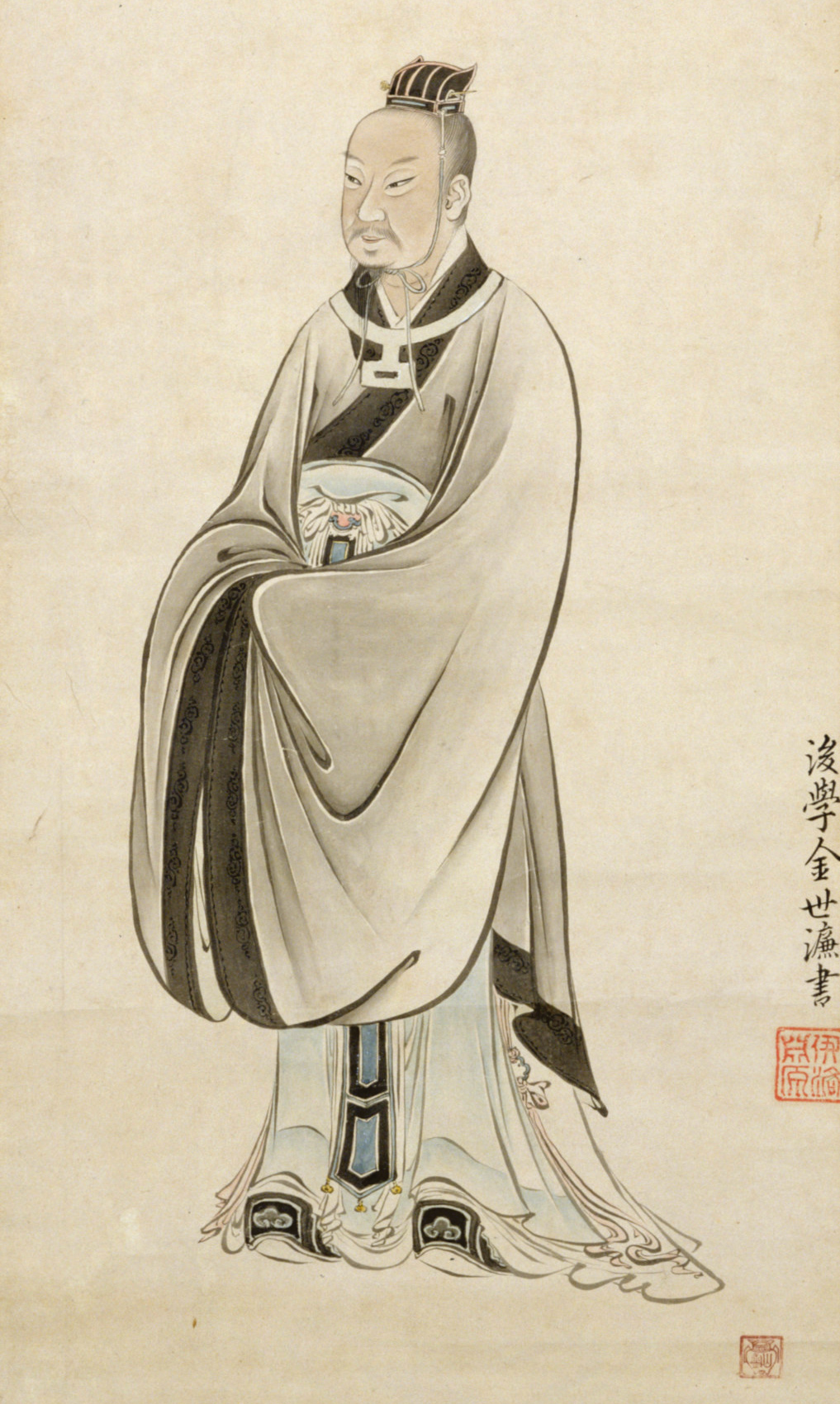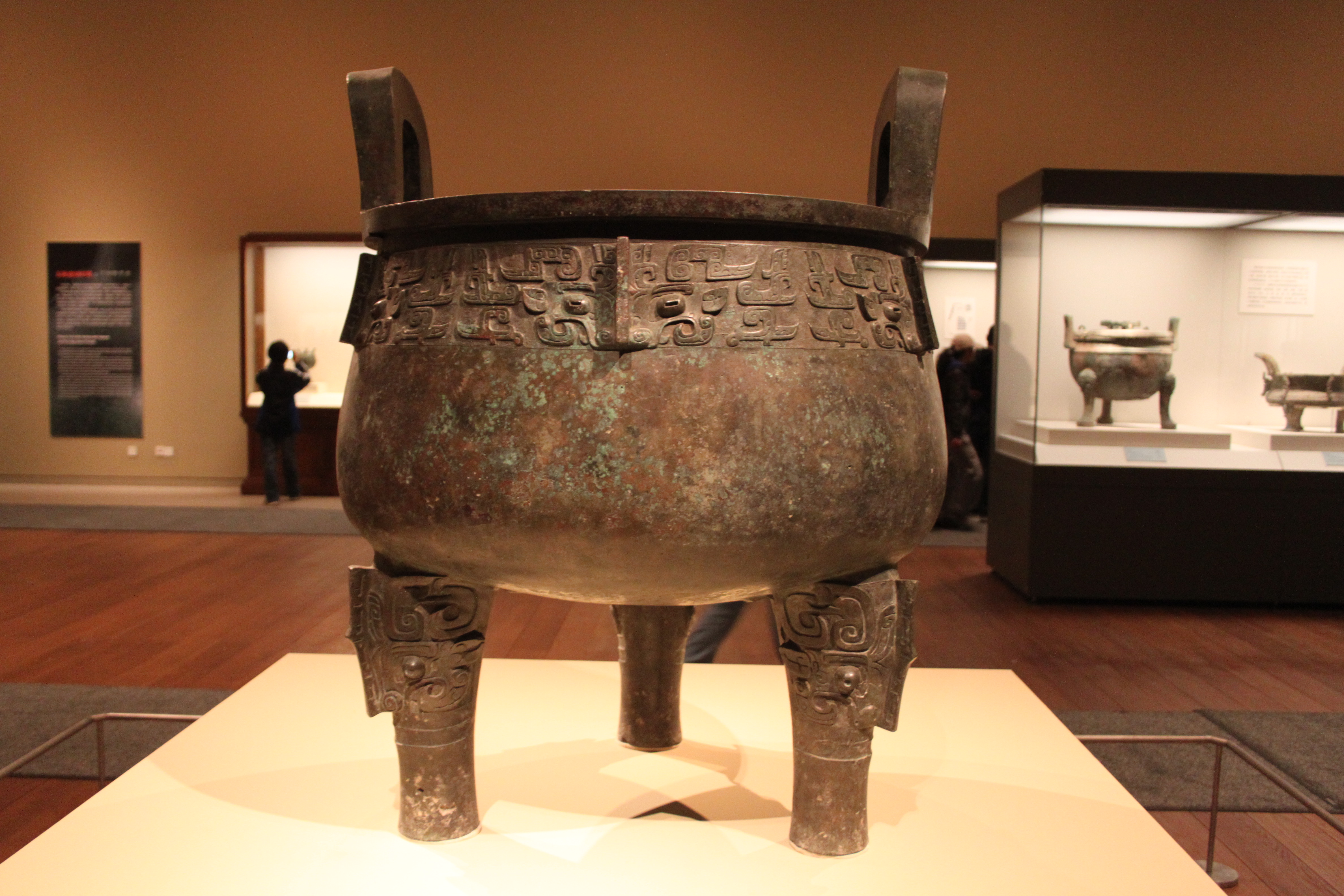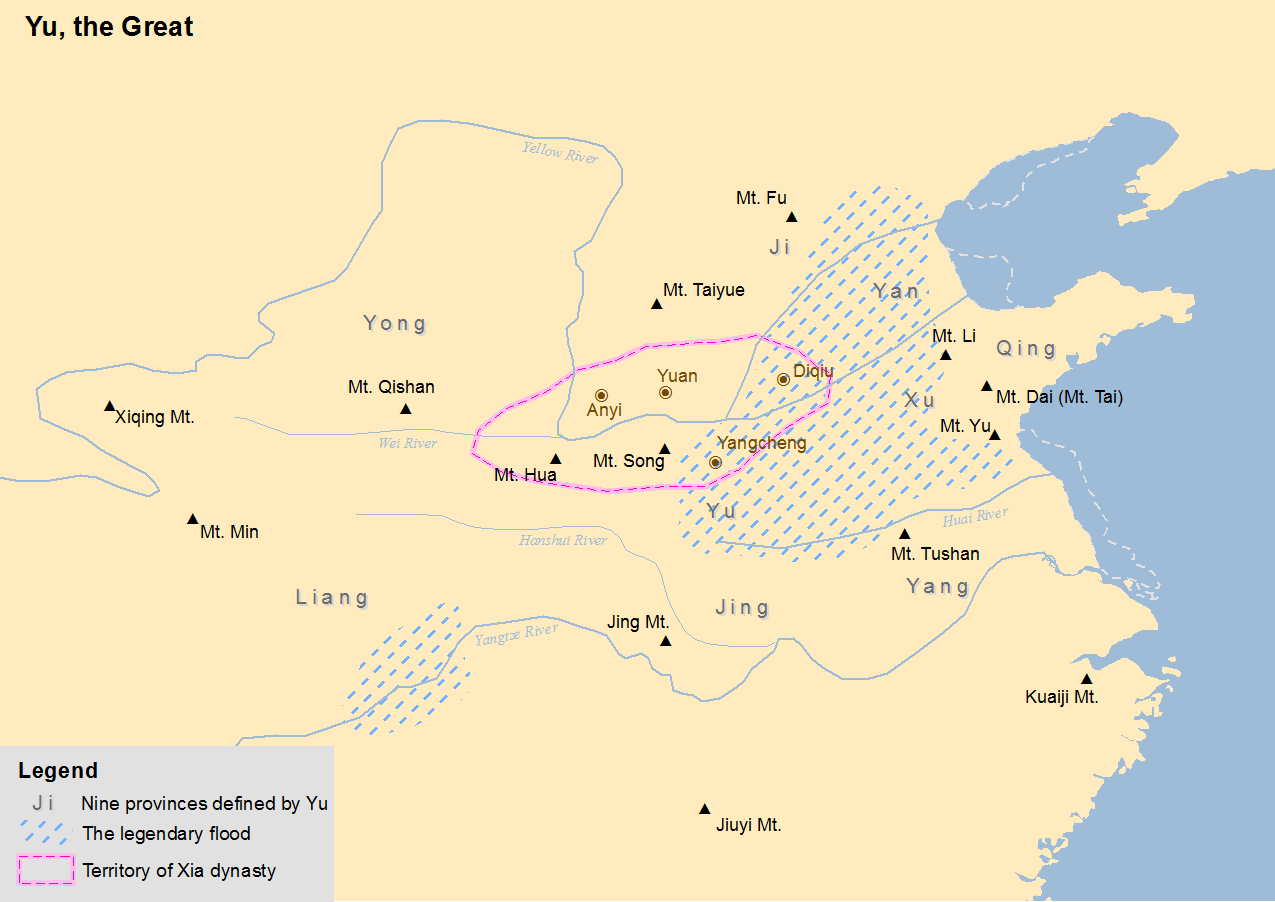|
Kongzi
Confucius ( ; zh, s=, p=Kǒng Fūzǐ, "Master Kǒng"; or commonly zh, s=, p=Kǒngzǐ, labels=no; – ) was a Chinese philosopher and politician of the Spring and Autumn period who is traditionally considered the paragon of Chinese sages. Confucius's teachings and philosophy underpin East Asian culture and society, remaining influential across China and East Asia to this day. Confucius considered himself a transmitter for the values of earlier periods which he claimed had been abandoned in his time. His philosophical teachings, called Confucianism, emphasized personal and governmental morality, correctness of social relationships, justice, kindness, and sincerity. His followers competed with many other schools during the Hundred Schools of Thought era, only to be suppressed in favor of the Legalists during the Qin dynasty. After the collapse of Qin and the victory of Han over Chu, Confucius's thoughts received official sanction in the new government. During the Tang and S ... [...More Info...] [...Related Items...] OR: [Wikipedia] [Google] [Baidu] |
Yan Hui
Yan Hui (–481 BC) was a Chinese philosopher. He was the favorite disciple of Confucius and one of the most revered figures of Confucianism. He is venerated in Confucian temples as one of the Four Sages. Names Yan Hui is also known by his courtesy name Ziyuan and as Yan Yuan, a combination of his surname and courtesy name. He is also reverently referred to as Master Yan or Yanzi. Life Yan Hui was a native of the state of Lu. His father Yan Wuyou (Yan Lu) was one of the earliest disciples of Confucius. Yan Hui was about 30 years younger than Confucius, and became a student of the Master at a young age. Yan Hui was Confucius' favorite disciple. "After I got Yan Hui," Confucius remarked, "the disciples came closer to me." We are told that once, when he found himself on the Nang hill with Yan Hui, Zilu, and Zigong, Confucius asked them to tell him their different aims, and he would choose between them. Zilu began, and when he had done, the master said, "It marks your bravery." ... [...More Info...] [...Related Items...] OR: [Wikipedia] [Google] [Baidu] |
Hundred Schools Of Thought
The Hundred Schools of Thought () were philosophies and schools that flourished from the 6th century BC to 221 BC during the Spring and Autumn period and the Warring States period of ancient China. An era of substantial discrimination in China, it was fraught with chaos and bloody battles, but it was also known as the Golden Age of Chinese philosophy because a broad range of thoughts and ideas were developed and discussed freely. This phenomenon has been called the Contention of a Hundred Schools of Thought (百家爭鳴/百家争鸣; ''bǎijiā zhēngmíng''; ''pai-chia cheng-ming''; "hundred schools contend"). The thoughts and ideas discussed and refined during this period have profoundly influenced lifestyles and social consciousness up to the present day in East Asian countries and the East Asian diaspora around the world. The intellectual society of this era was characterized by itinerant scholars, who were often employed by various state rulers as advisers on the methods of ... [...More Info...] [...Related Items...] OR: [Wikipedia] [Google] [Baidu] |
Confucianism
Confucianism, also known as Ruism or Ru classicism, is a system of thought and behavior originating in ancient China. Variously described as tradition, a philosophy, a religion, a humanistic or rationalistic religion, a way of governing, or a way of life, Confucianism developed from what was later called the Hundred Schools of Thought from the teachings of the Chinese philosopher Confucius (551–479 BCE). Confucius considered himself a transmitter of cultural values inherited from the Xia (c. 2070–1600 BCE), Shang (c. 1600–1046 BCE) and Western Zhou dynasties (c. 1046–771 BCE). Confucianism was suppressed during the Legalist and autocratic Qin dynasty (221–206 BCE), but survived. During the Han dynasty (206 BCE–220 CE), Confucian approaches edged out the "proto-Taoist" Huang–Lao as the official ideology, while the emperors mixed both with the realist techniques of Legalism. A Confucian revival began during the Tang dynasty (618–907 CE). In the late Tang, C ... [...More Info...] [...Related Items...] OR: [Wikipedia] [Google] [Baidu] |
Classic Of Poetry
The ''Classic of Poetry'', also ''Shijing'' or ''Shih-ching'', translated variously as the ''Book of Songs'', ''Book of Odes'', or simply known as the ''Odes'' or ''Poetry'' (; ''Shī''), is the oldest existing collection of Chinese poetry, comprising 305 works dating from the 11th to 7th centuries BCE. It is one of the "Five Classics" traditionally said to have been compiled by Confucius, and has been studied and memorized by scholars in China and neighboring countries over two millennia. It is also a rich source of '' chengyu'' (four-character classical idioms) that are still a part of learned discourse and even everyday language in modern Chinese. Since the Qing dynasty, its rhyme patterns have also been analysed in the study of Old Chinese phonology. Name Early references refer to the anthology as the ''300 Poems'' (''shi''). ''The Odes'' first became known as a ''jīng'', or a "classic book", in the canonical sense, as part of the Han Dynasty official adoption of Confuc ... [...More Info...] [...Related Items...] OR: [Wikipedia] [Google] [Baidu] |
Book Of Rites
The ''Book of Rites'', also known as the ''Liji'', is a collection of texts describing the social forms, administration, and ceremonial rites of the Zhou dynasty as they were understood in the Warring States and the early Han periods. The ''Book of Rites'', along with the '' Rites of Zhou'' (''Zhōulǐ'') and the '' Book of Etiquette and Rites'' (''Yílǐ''), which are together known as the "Three Li (''Sānlǐ'')," constitute the ritual ('' lǐ'') section of the Five Classics which lay at the core of the traditional Confucian canon (each of the "five" classics is a group of works rather than a single text). As a core text of the Confucian canon, it is also known as the ''Classic of Rites'' or ''Lijing'', which some scholars believe was the original title before it was changed by Dai Sheng. History The ''Book of Rites'' is a diverse collection of texts of uncertain origin and date that lacks the overall structure found in the other "rites" texts (the '' Rites of Zhou'' and the '' ... [...More Info...] [...Related Items...] OR: [Wikipedia] [Google] [Baidu] |
I Ching
The ''I Ching'' or ''Yi Jing'' (, ), usually translated ''Book of Changes'' or ''Classic of Changes'', is an ancient Chinese divination text that is among the oldest of the Chinese classics. Originally a divination manual in the Western Zhou period (1000750), the ''I Ching'' was transformed over the course of the Warring States and early imperial periods (500200) into a cosmological text with a series of philosophical commentaries known as the "Ten Wings". After becoming part of the Five Classics in the 2nd century BC, the ''I Ching'' was the subject of scholarly commentary and the basis for divination practice for centuries across the Far East, and eventually took on an influential role in Western understanding of East Asian philosophical thought. As a divination text, the ''I Ching'' is used for a traditional Chinese form of cleromancy known as ''I Ching'' divination, in which bundles of yarrow stalks are manipulated to produce sets of six apparently random numbers rang ... [...More Info...] [...Related Items...] OR: [Wikipedia] [Google] [Baidu] |
Western Zhou Dynasty
The Western Zhou ( zh, c=, p=Xīzhōu; c. 1045 BC – 771 BC) was a royal dynasty of China and the first half of the Zhou dynasty. It began when King Wu of Zhou overthrew the Shang dynasty at the Battle of Muye and ended when the Quanrong nomads sacked its capital Haojing and killed King You of Zhou in 771 BC. The Western Zhou early state was successful for about seventy-five years and then slowly lost power. The former Shang lands were divided into hereditary fiefs which became increasingly independent of the king. In 771 BC, the Zhou were driven out of the Wei River valley; afterwards real power was in the hands of the king's nominal vassals. Civil war Few records survive from this early period and accounts from the Western Zhou period cover little beyond a list of kings with uncertain dates. King Wu died two or three years after the conquest. Because his son, King Cheng of Zhou was young, his brother, the Duke of Zhou Ji Dan assisted the young and inexperienced king as reg ... [...More Info...] [...Related Items...] OR: [Wikipedia] [Google] [Baidu] |
Shang Dynasty
The Shang dynasty (), also known as the Yin dynasty (), was a Chinese royal dynasty founded by Tang of Shang (Cheng Tang) that ruled in the Yellow River valley in the second millennium BC, traditionally succeeding the Xia dynasty and followed by the Western Zhou dynasty. The classic account of the Shang comes from texts such as the '' Book of Documents'', '' Bamboo Annals'' and '' Records of the Grand Historian''. According to the traditional chronology based on calculations made approximately 2,000 years ago by Liu Xin, the Shang ruled from 1766 to 1122 BC, but according to the chronology based upon the "current text" of ''Bamboo Annals'', they ruled from 1556 to 1046 BC. Comparing the same text with dates of five-planet conjunctions, David Pankenier, supported by David Nivison, proposed dates of the establishment of the dynasty to 1554 BC. The Xia–Shang–Zhou Chronology Project dated the establishment to c. 1600 BC based on the carbon-14 dates of th ... [...More Info...] [...Related Items...] OR: [Wikipedia] [Google] [Baidu] |
Xia Dynasty
The Xia dynasty () is the first dynasty in traditional Chinese historiography. According to tradition, the Xia dynasty was established by the legendary Yu the Great, after Shun, the last of the Five Emperors, gave the throne to him. In traditional historiography, the Xia was later succeeded by the Shang dynasty. There are no contemporaneous records of the Xia, who are not mentioned in the oldest Chinese texts, since the earliest oracle bone inscriptions date from the late Shang period (13th century BC). The earliest mentions occur in the oldest chapters of the '' Book of Documents'', which report speeches from the early Western Zhou period and are accepted by most scholars as dating from that time. The speeches justify the Zhou conquest of the Shang as the passing of the Mandate of Heaven and liken it to the succession of the Xia by the Shang. That political philosophy was promoted by the Confucian school in the Eastern Zhou period. The succession of dynasties was incorporat ... [...More Info...] [...Related Items...] OR: [Wikipedia] [Google] [Baidu] |
Social Philosophy
Social philosophy examines questions about the foundations of social institutions, social behavior, and interpretations of society in terms of ethical values rather than empirical relations. Social philosophers emphasize understanding the social contexts for political, legal, moral and cultural questions, and the development of novel theoretical frameworks, from social ontology to care ethics to cosmopolitan theories of democracy, natural law, human rights, gender equity and global justice. Subdisciplines There is often a considerable overlap between the questions addressed by social philosophy and ethics or value theory. Other forms of social philosophy include political philosophy and jurisprudence, which are largely concerned with the societies of state and government and their functioning. Social philosophy, ethics, and political philosophy all share intimate connections with other disciplines in the social sciences. In turn, the social sciences themselves are of focal in ... [...More Info...] [...Related Items...] OR: [Wikipedia] [Google] [Baidu] |
Political Philosophy
Political philosophy or political theory is the philosophical study of government, addressing questions about the nature, scope, and legitimacy of public agents and institutions and the relationships between them. Its topics include politics, liberty, justice, property, rights, law, and the enforcement of laws by authority: what they are, if they are needed, what makes a government legitimate, what rights and freedoms it should protect, what form it should take, what the law is, and what duties citizens owe to a legitimate government, if any, and when it may be legitimately overthrown, if ever. Political theory also engages questions of a broader scope, tackling the political nature of phenomena and categories such as identity, culture, sexuality, race, wealth, human-nonhuman relations, ethics, religion, and more. Political science, the scientific study of politics, is generally used in the singular, but in French and Spanish the plural (''sciences politiques'' and ''cienci ... [...More Info...] [...Related Items...] OR: [Wikipedia] [Google] [Baidu] |
Poetry
Poetry (derived from the Greek ''poiesis'', "making"), also called verse, is a form of literature that uses aesthetic and often rhythmic qualities of language − such as phonaesthetics, sound symbolism, and metre − to evoke meanings in addition to, or in place of, a prosaic ostensible meaning. A poem is a literary composition, written by a poet, using this principle. Poetry has a long and varied history, evolving differentially across the globe. It dates back at least to prehistoric times with hunting poetry in Africa and to panegyric and elegiac court poetry of the empires of the Nile, Niger, and Volta River valleys. Some of the earliest written poetry in Africa occurs among the Pyramid Texts written during the 25th century BCE. The earliest surviving Western Asian epic poetry, the '' Epic of Gilgamesh'', was written in Sumerian. Early poems in the Eurasian continent evolved from folk songs such as the Chinese ''Shijing'', as well as religious hymns (the S ... [...More Info...] [...Related Items...] OR: [Wikipedia] [Google] [Baidu] |








.jpg)